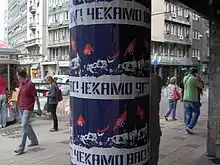Far-right politics in Serbia
Far right in Serbia mostly focuses on national and religious factors and it refers to any manifestation of far-right politics in the Republic of Serbia.
| Part of the Politics and elections and Politics series on |
| Neo-fascism |
|---|
|
|

Anti-immigrantion protests by the Leviathan Movement
Political parties
- Active
- Serbian Radical Party,[1] (far-right) — Ultranationalist, irredentist, hard eurosceptic and russophilic political party led by convicted war criminal Vojislav Šešelj. Its won 8.10% of parliamentary popular vote at the 2016 parliamentary election, but did not pass the 3% electoral threshold in 2020.The SRS has been described by observers as "neofascist".[2][3][4][5]
- Serbian Party Oathkeepers (far-right) — Ultranationalist, national-conservative, russophilic and anti-NATO political party, did not pass the 3% electoral threshold in at the 2020 Serbian parliamentary election..
- The "Serbian Right" (far-right) — Ultranationalist, anti-immigration, islamophobic, hard eurosceptic and russophilic political party, in close relationship with the SNS-led regime in Serbia.
- People's Freedom Movement (right-wing to far-right) — Nationalist, right-wing populist, hard eurosceptic and anti-immigration political party, participating in the 2020 parliamentary election within the right-wing "National bloc" list, but did not pass the 3% electoral threshold.
- The Leviathan Movement (far-right) — Ultranationalist, anti-immigration and neo-fascist political subject,[6][7] identifies as animal rights organization, did not pass the 3% electoral threshold in at the 2020 Serbian parliamentary election.
- Historical
- Dveri (right-wing to far-right) — Nationalist, right-wing populist, eurosceptic and anti-immigration political party led by Boško Obradović. They are a member of Alliance for Serbia and they are also boycotting the 2020 Serbian parliamentary election.
- Party of Serbian Unity (far-right) — Nationalist and irredentist political party founded by Serbian paramilitary leader and criminal Željko Ražnatović Arkan, merged into Serbian Radical Party in 2007.
Organizations
- Active
- 1389 Movement — Ultranationalist, clero-fascist, irredentist, anti-NATO, hard eurosceptic and russophilic youth movement based on the Russian Nashi, founded in 2004.
- Serbian National Movement 1389 — Ultranationalist political movement, split from the 1389 Movement in 2008.
- Serbian Action ("Srbska akcija") — an Orthodox clero-fascist and ultranationalist political organization, founded in 2010.

Homophobic poster by Obraz
- Obraz — Ultranationalist, clero-fascist and russophilic political organization founded in 1993. The organization is constitutionally banned but only 2 years after the organization registered itself under a name "Srpski Obraz".
- Srbska Čast ("Serbian honor") — Ultranationalist, russophilic, irredentist, islamophobic and paramilitary organization.
- The "Ravna Gora Chetnik Movement" — Ultranationalist, irredentist and islamophobic movement.
- "I live for Serbia" movement — Ultranationalist, anti-vaccination and anti-immigration political organization.
- Defunct
- Tsar Lazar Guard — former ultranationalist and paramilitary organization.
- Nacionalni stroj ("National Alignment") — was a Neo-Nazi political organization based in the Vojvodina province. It had orchestrated several incidents since 2005. In late 2005, charges were pressed against 18 of the leading members in Novi Sad, and each of the suspects were facing up to eight years in prison.[8] It was banned in Serbia in 2012.[9]
Footnotes
- Michael Minkenberg (15 April 2014). Historical Legacies and the Radical Right in Post-Cold War Central and Eastern Europe. Columbia University Press. p. 192. ISBN 978-3-8382-6124-9.
- Ottaway, David (1993). "PRESIDENT OF SERBIA DISSOVLES PARLIAMENT". Washington Post. Retrieved 20 December 2018.
- Traynor, Ian (2004). "Hardliner looks set to win poll in Serbia". The Guardian. Retrieved 21 December 2018.
- Zimonjic, Vesna (1997). "YUGOSLAVIA: Fascism Knocking On Serbia's Door". INTER PRESS SERVICE News Agency. Retrieved 21 December 2018.
- Bodi, Faisal (2002). "Call this monster by its name". The Guardian. Retrieved 21 December 2018.
- "Ljubitelji životinja koji vređaju žrtve fašista - šta je, zapravo, Levijatan?". N1. May 20, 2020.
- "Pavle Bihali je spojio nemoguće, jevrejsko poreklo i nacističke simbole". NOVA portal. Retrieved 2020-06-09.
- "Nacionalni stroj" pred sudom, BBC Serbian.com, January 9, 2006
- "Tempirane bombe mržnje". Novosti (in Croatian) (633). February 4, 2012. Retrieved February 6, 2012.
This article is issued from Wikipedia. The text is licensed under Creative Commons - Attribution - Sharealike. Additional terms may apply for the media files.
